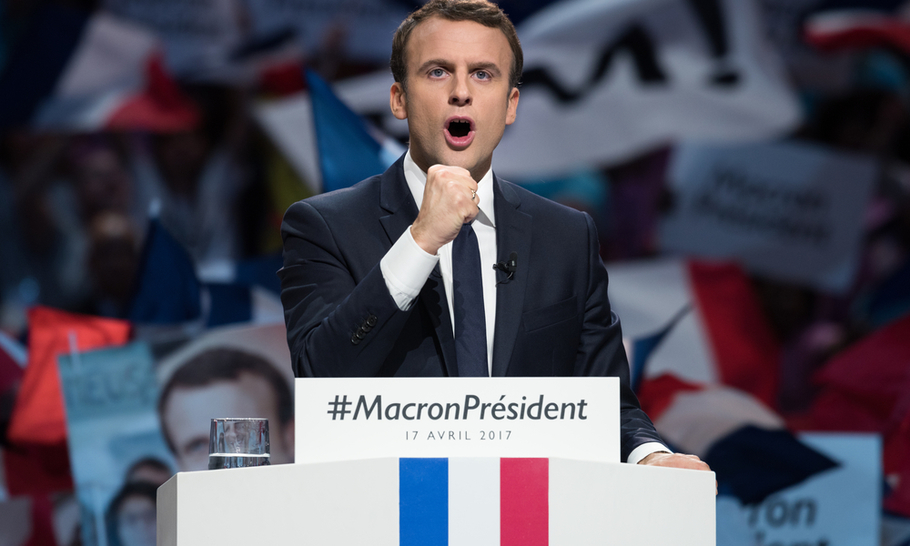Emmanuel Macron has a week to save his presidency

Emmanuel Macron flew back from Buenos Aires last weekend to find Paris in uproar. Today’s front page of The Times bears a photograph of the French President standing in front of an Arc de Triomphe adorned with obscene graffiti telling him what he can do with himself.
Macron is visibly angry: with the “yellow vest” fuel protesters for unleashing extremists of Left and Right, with his police chiefs for allowing a sacred monument to be trashed, and with himself for putting his own career at risk. Macron knows that there can be no repetition of this violence. He has a week at most to save his presidency.
The Arc is after all the place, beneath which France’s Unknown Soldier lies interred, where only three weeks ago on the centenary of Armistice Day Macron lectured world leaders, and especially Donald Trump, about the “demons” some of them were summoning up with nationalist slogans. Now it is Macron himself who, like Don Giovanni, appears to be wrestling with demons, dragging him down to political perdition.
Even before the fuel protests began a few weeks ago, he was already the most unpopular French President in modern times. He has since made himself not merely disliked but loathed, by adopting a grandiose “Jupiter” tone when dismissing the concerns of ordinary people who merely worry about getting through to the end of the month, while he worries about “the end of the world”.
By this, of course, he means climate change. But green taxes, such as those that France has imposed, invariably hit the poor hardest and are causing political turmoil all over the world. The most obvious example was the victory of Donald Trump, a climate sceptic, over Hillary Clinton, but a more recent casualty was Malcolm Turnbull in Australia, who takes a similar line on climate change to Macron. He has been replaced by Scott Morrison, a pragmatic centre-Right politician who doesn’t believe in penal energy taxes.
Even more damaging to Macron than his fiscal and other economic policies, though, has been his failure to maintain law and order. There have been no major terrorist attacks under his rule, it is true, but the security challenges that he inherited, above all the disaffection of young Muslims in the suburbs, have not been addressed. Instead, he has devoted all his efforts to crushing the opposition, both the far-Right National Rally, led by Marine Le Pen, and the far-Left Unbowed France, led by Jean-Luc Mélenchon. They are both encouraging the protests, supported by more than three quarters of the public, but Macron has raised the temperature by his rhetoric, calling nationalists Europe’s “lepers”. If you demonise your opponents, you turn a democracy into pandaemonium.
It is not true, as many news outlets are reporting, that the riots in Paris are the worst for half a century. As recently as 2005, three people died and nearly three thousand were arrested when mainly Muslim youths rioted in the banlieues, burning cars and injuring more than a hundred police. And France was under a state of emergency (or “state of siege”) for almost two years after the terror attacks of November 2015.
Paris has dreaded the destructive power of the mob since time immemorial. In volume IV of his magisterial History of the Hundred Years War, Jonathan Sumption writes of the early 15th century: “Fear of revolution in their capital had been an abiding anxiety of the kings of France for many years.” Of one of these revolutions, which brought the monarchy to its knees, Lord Sumption observed: “The events of 28 April 1413 opened a new reign of terror in Paris. The mob adopted white hoods as the uniform of their revolution.” So the only novelty about the riots we are now seeing in Paris is the yellow vests.
The truth is that France in general, and Paris in particular, has witnessed appalling political violence on a regular basis throughout history. Louis XVI already knew this when reports reached Versailles in 1789 that the Bastille had fallen: “It is a big revolt.” Famously, the Duc de La Rochefoucauld-Liancourt, a social reformer with a better grasp of political reality, replied “No, Sire, it is a big revolution.”
Both the king and the duke were implicitly acknowledging that the political elites of France rule only for as long as they can control the mob. Emmanuel Macron had better hope that he can do a lot better than the ancien régime in deploying force to deter those bent on violence while defusing the demands of the people. Even Macron’s hero Charles de Gaulle had his prestige and self-confidence so badly damaged by the Parks “events” of May 1968 that he resigned a year later. Macron can boast none of de Gaulle’s achievements. If he fails to quell the yellow vests, the anti-fuel tax revolt could become an anti-Macron revolution. “Jupiter” could discover quite soon that he is mortal after all.





